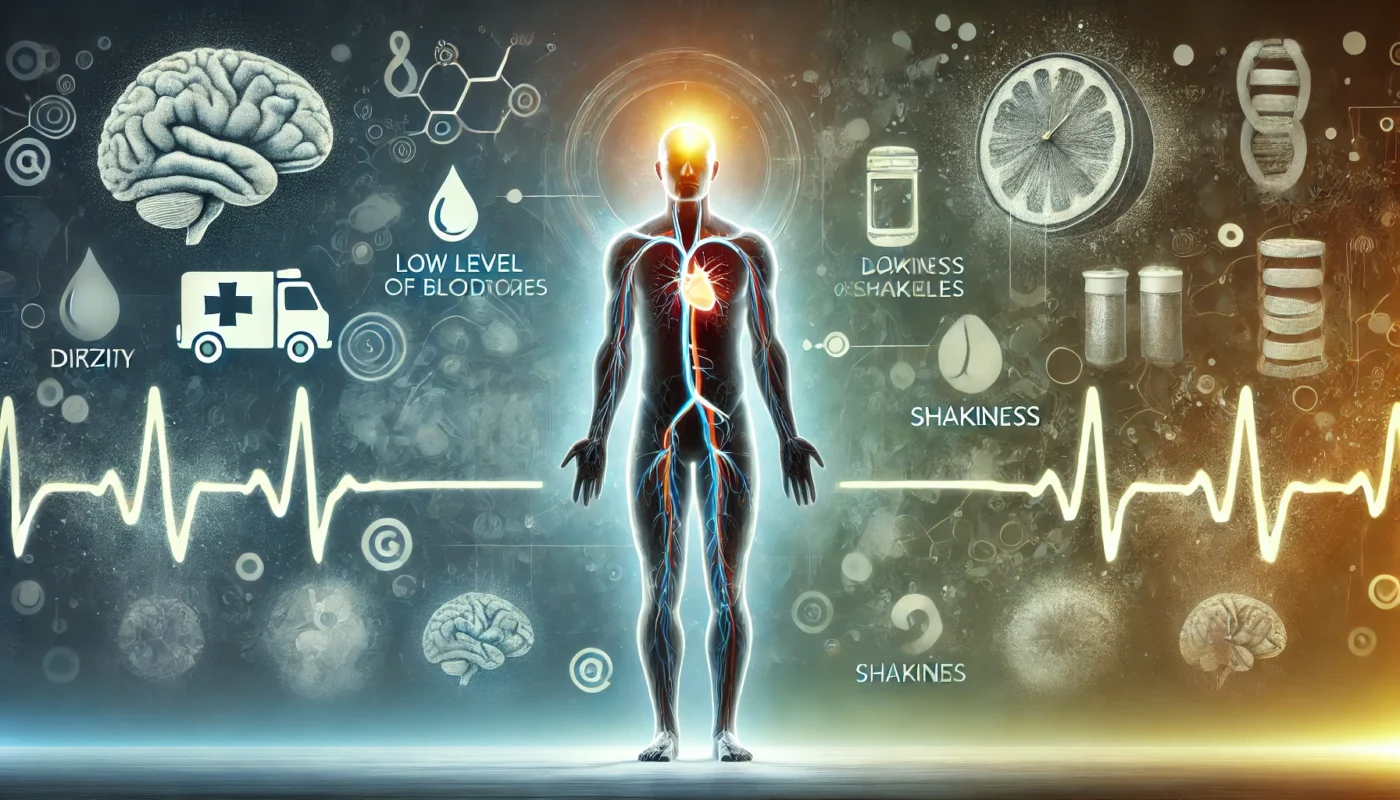Hypoglycemia, commonly referred to as low blood sugar, is a condition characterized by abnormally low levels of glucose in the bloodstream. It is a significant concern for individuals with diabetes and can also occur in non-diabetic individuals due to various underlying causes. Glucose is the primary source of energy for the body and brain, and insufficient levels can lead to severe symptoms and complications if left untreated. This article will discuss the definition, symptoms, causes, treatment options, and prevention strategies for hypoglycemia. It will also explore the role of nutritional supplements in managing the condition.
You May Also Like:
What is Hypoglycemia?
Hypoglycemia occurs when blood sugar levels drop below the normal range, typically under 70 milligrams per deciliter (mg/dL). While hypoglycemia is most commonly associated with diabetes and insulin therapy, it can also arise in individuals without diabetes due to other medical conditions, lifestyle factors, or dietary habits.
Glucose is essential for maintaining normal physiological functions, particularly for the brain, which relies heavily on glucose for energy. A prolonged lack of glucose can lead to cognitive impairment, loss of consciousness, and in severe cases, coma. Early detection and treatment are crucial to prevent such complications.

Symptoms of Hypoglycemia
The symptoms of hypoglycemia can vary based on severity and individual differences. Early symptoms include:
- Shakiness: Tremors or a sense of instability.
- Sweating: Excessive perspiration unrelated to physical exertion.
- Hunger: A sudden, intense craving for food, particularly carbohydrates.
- Dizziness or Lightheadedness: A feeling of unsteadiness or faintness.
- Irritability or Mood Changes: Unexplained anger, anxiety, or agitation.
- Heart Palpitations: An abnormally rapid or irregular heartbeat.
Severe hypoglycemia can lead to:
- Confusion: Difficulty concentrating or thinking clearly.
- Blurred Vision: Impaired visual acuity.
- Seizures: Convulsions or muscle spasms in extreme cases.
- Loss of Consciousness: Fainting or becoming unresponsive.
Prompt recognition and treatment of these symptoms can prevent further complications.
Causes of Hypoglycemia
Hypoglycemia occurs when glucose consumption outpaces its production or availability in the bloodstream. Common causes include:
1. Diabetes Treatment
Excessive doses of insulin or oral diabetes medications, particularly sulfonylureas, can result in hypoglycemia. A 2019 study in Diabetes Care reported that hypoglycemia affects nearly 20% of individuals with Type 1 diabetes and 10% of those with Type 2 diabetes.
2. Fasting or Skipped Meals
Prolonged periods without eating can deplete glucose reserves, leading to hypoglycemia. This is particularly common in individuals on calorie-restricted diets.
3. Alcohol Consumption
Excessive alcohol intake can interfere with glucose production in the liver, causing hypoglycemia. Chronic alcohol use exacerbates this risk.
4. Hormonal Imbalances
Conditions such as Addison’s disease or hypothyroidism can disrupt glucose regulation and lead to hypoglycemia.
5. Severe Illness
Liver or kidney disease and infections can impair glucose metabolism, increasing the likelihood of hypoglycemia.
6. Reactive Hypoglycemia
This occurs in non-diabetic individuals, typically after a high-carbohydrate meal, when excessive insulin production lowers blood sugar levels rapidly.

Treatment Options for Hypoglycemia Recovery
Effective treatment of hypoglycemia requires prompt intervention to restore blood sugar levels and address underlying causes. Key treatment strategies include:
1. Immediate Glucose Intake
The “15-15 rule” is commonly used: consume 15 grams of fast-acting carbohydrates (e.g., glucose tablets, fruit juice, or candy), wait 15 minutes, and recheck blood sugar levels. Repeat if necessary. A 2021 randomized controlled trial in Journal of Clinical Endocrinology found that fast-acting glucose significantly reduced hypoglycemia symptoms in 85% of patients.
2. Glucagon Injection
For severe hypoglycemia, a glucagon injection is recommended to stimulate glucose release from the liver. This is particularly effective in cases of unconsciousness.
3. Adjusting Diabetes Medications
Modifying insulin or oral medication dosages under a healthcare provider’s guidance can prevent recurrent hypoglycemia.
4. Addressing Underlying Conditions
Treating conditions such as hormonal imbalances or liver dysfunction is essential for preventing future episodes.
Nutritional Supplementation for Hypoglycemia Relief
Nutritional supplements can play a supportive role in stabilizing blood sugar levels and enhancing overall metabolic health. The following supplements have been identified as beneficial for individuals prone to hypoglycemia:
1. Chromium Picolinate
Chromium improves insulin sensitivity and helps stabilize blood sugar levels. A study in Diabetes Technology & Therapeutics (2020) showed that chromium supplementation reduced blood sugar fluctuations in individuals with reactive hypoglycemia.
2. Magnesium Glycinate
Magnesium is vital for glucose metabolism and insulin function. A 2018 clinical trial in Magnesium Research found that magnesium supplementation improved glycemic control and reduced the frequency of hypoglycemic episodes in Type 2 diabetes patients.
3. Zinc Picolinate
Zinc supports pancreatic function and insulin secretion. A 2019 study in Clinical Nutrition reported that zinc supplementation improved blood sugar stability and reduced hypoglycemia risk in both diabetic and non-diabetic individuals.
4. Vitamin B12 (Methylcobalamin)
Vitamin B12 is essential for nerve health and metabolic processes. Its deficiency can impair glucose metabolism. Research in Journal of Nutrition (2017) found that B12 supplementation reduced hypoglycemia symptoms in patients with neuropathy.
5. Alpha-Lipoic Acid (ALA)
ALA is an antioxidant that enhances glucose uptake and reduces oxidative stress. A 2021 study in Diabetes Research and Clinical Practice demonstrated that ALA supplementation improved blood sugar regulation in patients with reactive hypoglycemia.
6. L-Arginine
This amino acid promotes nitric oxide production and improves insulin sensitivity. A 2020 randomized trial in Journal of Endocrinology showed that L-arginine supplementation reduced the frequency of hypoglycemic episodes in non-diabetic individuals.

Steps for Possible Prevention of Hypoglycemia
Preventing hypoglycemia involves maintaining stable blood sugar levels through dietary and lifestyle modifications. The following steps can help reduce the risk:
1. Regular Meals and Snacks
Eat balanced meals at regular intervals, including complex carbohydrates, protein, and healthy fats. Avoid skipping meals to prevent blood sugar dips.
2. Monitor Blood Sugar Levels
Frequent blood glucose monitoring helps identify patterns and prevent hypoglycemia. This is particularly crucial for individuals with diabetes.
3. Adjust Medication Dosages
Work with a healthcare provider to tailor diabetes medications to individual needs, avoiding excessive insulin or oral hypoglycemic agents.
4. Limit Alcohol Consumption
Consume alcohol in moderation and always pair it with food to prevent hypoglycemia.
5. Include High-Fiber Foods
Foods high in fiber, such as whole grains and vegetables, help stabilize blood sugar levels by slowing glucose absorption.
6. Stay Hydrated
Dehydration can impair glucose regulation, so adequate water intake is essential.
7. Manage Stress
Chronic stress disrupts hormonal balance and blood sugar control. Incorporate stress management techniques such as meditation or yoga into your routine.
8. Carry Emergency Glucose
Always have glucose tablets or sugary snacks available to address symptoms promptly.
9. Educate Family and Friends
Inform those around you about hypoglycemia and its symptoms to ensure timely assistance during an episode.
Conclusion
Hypoglycemia is a condition that requires careful management and awareness to prevent complications and improve quality of life. Through a combination of dietary changes, regular monitoring, and prompt treatment, individuals can effectively manage hypoglycemia. Nutritional supplements such as chromium, magnesium, zinc, and alpha-lipoic acid offer additional support by stabilizing blood sugar levels and enhancing metabolic health. Preventive strategies, including regular meals and stress management, further reduce the risk of hypoglycemia. By taking these steps, individuals can maintain stable blood sugar levels and avoid the adverse effects of hypoglycemia.
Managing hypoglycemia is a dynamic process that involves proactive measures, and with proper care, individuals can achieve optimal glucose control.

References
- Effect of L-arginine supplementation on insulin resistance and serum adiponectin concentration in rats with fat diet. Retrieved from: https://pmc.ncbi.nlm.nih.gov/articles/PMC4565209/
- Autoimmune hypoglycaemia caused by alpha-lipoic acid: a rare condition in Caucasian patients. Retrieved from: https://pmc.ncbi.nlm.nih.gov/articles/PMC6300856/
- Zinc supplementation improves glycemic control for diabetes prevention and management: a systematic review and meta-analysis of randomized controlled trials. Retrieved from: https://www.sciencedirect.com/science/article/pii/S0002916522011546
- The Effects of Oral Magnesium Supplementation on Glycemic Response among Type 2 Diabetes Patients. Retrieved from: https://pubmed.ncbi.nlm.nih.gov/30587761/
- Prevalence of Hypoglycemia and Its Determinants Among Diabetes Patients on Insulin Treatment at Tepi General Hospital, Southwest, Ethiopia. Retrieved from: https://pmc.ncbi.nlm.nih.gov/articles/PMC11168415/
Important Note: The information contained in this article is for general informational purposes only, and should not be construed as health or medical advice, nor is it intended to diagnose, prevent, treat, or cure any disease or health condition. Before embarking on any diet, fitness regimen, or program of nutritional supplementation, it is advisable to consult your healthcare professional in order to determine its safety and probable efficacy in terms of your individual state of health.
Regarding Nutritional Supplements Or Other Non-Prescription Health Products: If any nutritional supplements or other non-prescription health products are mentioned in the foregoing article, any claims or statements made about them have not been evaluated by the U.S. Food and Drug Administration, and such nutritional supplements or other health products are not intended to diagnose, treat, cure, or prevent any disease.

